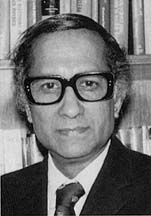Personal tools
News from ICTP 103 - Dateline

Sivaramakrishna Chandrasekhar, founder and now director
emeritus of the Centre for Liquid Crystal Research, Bangalore,
India, helped organise a meeting on discotic liquid crystals,
held at ICTP, on 25-29 November 2002.
More than an organiser, Chandrasekhar attended the meeting as
an honoured guest. That's because some 25 years ago, Chandrasekhar
published a 'pathbreaking' paper in the Indian physics journal
Pramana, reporting the first synthesis of discotic liquid
crystals.
Such crystals display unique part-liquid/part-solid 'mesophases.'
Chandrasekhar's team found that these disc-like molecules, which
he prefers to describe as poker chips, could be ordered as columns
in a two-dimensional hexagonal lattice that is crystal-like (solid)
in its horizontal direction, but liquid-like in its vertical direction.
As a result, discotic liquid crystals embody a blend of stability
(solidness) and fluctuation (liquidness).
Opening up a new liquid-crystal class, distinct from those arising
from previously known rod-like molecules, his discovery has attracted
increasing interest over the past decade. It is now estimated
that as many as 3000 discotic molecules have been created in laboratories
worldwide and that an even larger number of scientific papers
have been written on the subject.
In addition to conference presentations by scientists from Cambridge
University (UK), the Max Planck Institute (Germany), the University
of Bologna (Italy), Shinshu University (Japan), the Weizmann Institute
of Science (Israel) and the Naval Research Laboratory (USA), work
presented by Fuji Co.'s industrial lab indicated growing interest
in applications of discotics--for example, in liquid crystal computer
displays.
Elected a fellow of the Royal Society and a recipient of many
other honours, Chandrasekhar nevertheless has remained steadfastly
modest. While delighted to see his molecules arousing such widespread
interest, he still prefers to focus on their fascinating behaviour
rather than their potential applications in the world of high
technology.
"My attitude," says Chandrasekhar, "hasn't made
me a rich man, but it has made me a happy one. I've been able
to fulfill the dream of discovery. No scientist could ask for
more."
Nobels in Trieste
Three of this year's Nobel Laureates have participated in ICTP activities. Masatoshi Koshiba (Japan), Nobel prize winner in physics whose first visit to ICTP took place in 1987, last lectured at the Centre at the Fifth School on Non-Accelerator Particle Astrophysics in 1998; Kurt Wuthrich (Switzerland), Nobel prize winner in chemistry, lectured at the College in Biophysics in 1992, 1994, and 1996; and Sydney Brenner (UK), Nobel prize winner in medicine, lectured at the Symposium on Contemporary Physics in 1968, one of the seminal events in ICTP history.

Kurt Wuthrich at ICTP 1992
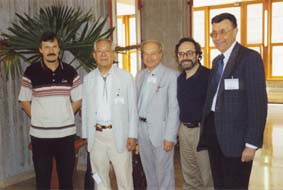
Masatoshi Koshiba (second from left) at ICTP 1998
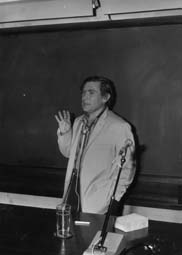
Sydney Brenner at ICTP 1968
Sir Paul Nurse

Sir Paul Nurse, one of the 2001 Nobel Laureates in medicine
and recently appointed president of The Rockefeller University,
USA, visited Trieste's international scientific institutions on
11 October. Sir Paul met ICTP acting director Erio Tosatti, and
officials from the ELETTRA synchrotron light laboratory
and the International School of Advanced Studies (SISSA), where
he held a lecture on "controlling the fission yeast cell
cycle."
Volvo Prize
Sir Partha Dasgupta and Karl-Goran Maler, the two primary organisers of the ecological economics research and training activity hosted by ICTP, have been awarded the Volvo Prize for their contributions to environmental and resource economics. The prize carries a cash award of US$150,000. Dasgupta, a native of India, is professor of economics at the University of Cambridge, UK. Mäler is professor of economics at the Stockholm School of Economics and director of the Beijer International Institute of Ecological Economics, Sweden. (See News from ICTP, "Valuing Nature Through Science," Summer 2002, pp. 4-5.)
ICTP Prize 2002
Mohit Randeria, associate professor, Tata Institute of Fundamental Research, Mumbai, India, has been awarded the 2002 ICTP Prize in the field of condensed matter physics. Randeria is one of the world's foremost experts in high temperature superconductivity and strongly correlated electron systems. His most noteworthy contributions involve the development of a theory of non-Fermi liquid behaviour of high-Tc superconductors and a theoretical interpretation of experiments on the pseudogap state in high-Tc superconductors. His article on the latter subject, published in Nature in 1996, has been cited 600 times. The prize is being given in honour of Nobel Laureate Philip W. Anderson, a long-time friend of ICTP.
ECO Award
The Economic Cooperation Organization (ECO) recently honoured former ICTP Associate Riazuddin for his life-long contributions to science and technology in Pakistan and southeast Asia. The ceremony took place in October at ECO's 7th Summit Meeting in Istanbul. ECO, whose membership includes Afghanistan, Azerbaijan, Iran, Kazakhstan, Kyrgizstan, Pakistan, Tajikistan, Turkey, Turkmenistan and Uzbekistan, is dedicated to regional economic development and co-operation. Riazuddin, a distinguished theoretical physicist whose affiliation with ICTP dates back to the Centre's earliest days, is director of the National Centre for Physics (NCP) in Pakistan.
Honouring Narasimhan
ICTP and SISSA (International School for Advanced Studies) co-organised a Colloquium on Geometry to celebrate the 70th birthday of Mudumbai S. Narasimhan, former head of the ICTP mathematics group and presently a visiting professor at SISSA.
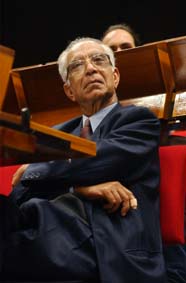
The meeting took place from 2-6 December in the ICTP Main Lecture
Hall, where international experts presented a series of lectures
on topics related to Narasimhan's contributions to the fields
of algebraic and differential geometry. Born in a rural village
in southern India, Narasimhan served as professor of mathematics
at Tata Institute of Fundamental Research in Mumbai for more than
25 years. ICTP's founding director, Abdus Salam, recruited Narasimhan
to work at the Centre in 1992, where Narasimhan served as head
of the mathematics group until 1998 and subsequently as a consultant.
He was elected a fellow of the Royal Society in 1996.
New Staff
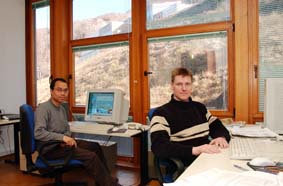
Two new staff members have joined ICTP's physics of weather
and climate group. German-born Fred Kucharski, a visiting
scientist at ICTP for the past two years, previously held a postdoc
at Reading University's Meteorological Department, UK, and served
as a staff member of the meteorological office in Bracknell, UK.
His main area of research focusses on global climate variability
in timescales ranging from months to decades--research that includes
such phenomena as El Niño/Southern Oscillations (ENSO)
and North Atlantic Oscillations (NAO). Kucharski earned his Ph.D.
at the University of Frankfurt's Institute of Meteorology and
Geophysics. Chinese-born Xunqiang Bi, who earned his Ph.D.
at the Chinese Academy of Sciences' Institute of Atmospheric Physics
(IAP) in Beijing, enjoyed a brief tenure as a visiting scientist
at the State University of New York at Albany (USA) and worked
at IAP's Laboratory of numerical modelling for Atmospheric Sciences
and Geophysical fluid dynamics (LASG). Since 1998, he has been
a visiting scientist at ICTP, where his research has focussed
on regional climate simulation in East Asia, Europe, and Africa.
NEWS FROM ASSOCIATES

ICTP Senior Associate (2001-2005) A.K.M. Azharul Islam
has been appointed vice-chancellor of the International Islamic
University, Chittagong, Bangladesh. In 2001, Azharul Islam was
awarded the Islamic Educational, Scientific and Cultural Organization
(ISESCO) Science Award for his wide-ranging contributions to physics.
His current fields of interest include electronic and structural
properties of solids and superconductivity.
